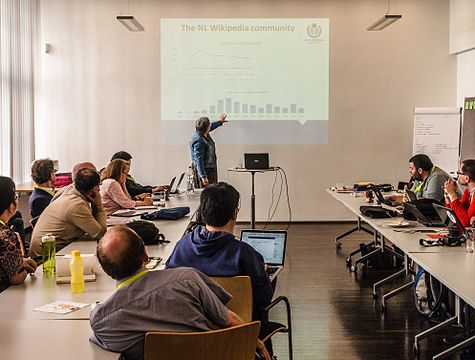Wikimedia Conference 2016/Program/29
29: Community health: what can (not) be done? The experiences of WMNL and WMIL
[edit]How to move forward
[edit]-
Sandra presenting
- What was this session about?
Sandra presented how Wikimedia Nederland (together with Wikimedia Israel) dealt with the topic of Community Health.
- What are the next steps to be taken?
- Possibly, create platform for sharing experiences on community health
- Who is the person to reach out to?
- Photos
- Slides

- Original Description
- Community health is becoming an issue of interest in the Wikimedia movement: how to ensure that Wikimedia-communities remain viable and sustainable? There is a growing attention for issues like editor retention, gender imbalance, working climate and conflict resolution. The Wikimedia Foundation and some affilliates are looking at ways in which they can support healthy communities. But what is a healthy community? And what can you do to improve community health?
Wikimedia Nederland and Wikimedia Israel started working on the topic last year. This workshop will share what they learned along the way, especially about working with the community on this topic.
But this will not be one-way presenting of results. The audience in the room will be asked to critically reflect on WMNL and WMIL's experiences and come up with new (and better!) ways of working on community health. - Session Format
- Learning (Workshop)
- Desired Outcome
- List of steps to take when starting out on a community health programme
- Speaker
- Sandra Rientjes (WMNL)
- Summary of the session
Sandra Rientjes (Wikimedia Nederland) opens the session to on Wikimedia Nederland’s experiences dealing with “Community Health”. This topic is getting increasing attention movement-wide, and is often linked to topics such as user retention, welcoming new editors, online conflicts, and general working atmosphere. Sandra explained that the session was prepared jointly with Wikimedia Israel, namely Michael Lester.
Sandra asked generally “What is a community?” and showed possible explanations and definitions for “community”. She then asked the audience to come up with, in their opinion, criteria that would indicate good community health.
When clustered, these criteria related to:
- composition: who is part of the community?
- dynamics: how does the community function as a group?
- activities and output
Furthermore, she indicated three questions which can help in determining whether a community is healthy or not.
- Is the community able to fulfill its core role?
- Will it still be able to do so in the future?
- Are members of the community satisfied, content and/or proud of being a member?

Afterwards, Sandra asked the audience, who thinks that his or her Wikipedia community is in top health. There was general laughter and no hands raised. She asked then who thinks that their community is doing more or less OK. Most raised hands. Finally, Sandra asked who thinks that we ought to call for a “Wiki-ambulance” for their community. Some raise thier hands.
Sandra presents some results of the Dutch Wikipedia community survey (see the slides 13-24) which showed that there are quite some health issues.
Sandra asked then if a chapter can play a role in improving community health. A participant said that chapter-community relations were important and they should be improved by bringing the community into the office and getting to know each other.
Sandra was asked if the surveyed people left their contact information. Sandra answered that they did not; they accessed the survey via site banners. Some of them probably don’t know of the survey results. A participant said that half of their community members meet each other sometimes. Organizing more meetings is not a complete solution to their problems. Another participant added that having discussions about the projects outside the regular channels can create feelings of “cabal”.
Sandra explained that choice of Wikimedia Nederland was to increase the number of real-life events and to implement a gender gap program as more women active was expected to change the tone of debate within the community. At the moment, WMNL is experimenting with a training program which helps community members increase their skills in online communication and moderating conflicts. A further step could be to introduce a “Volunteer Intervention Force” of committed and trained volunteers who can step in when a conflict is seen, before it escalates.
Additionally, Sandra explained that in working on community health WMNL follows the rule of “first do not harm”. Don’t develop initiatives that may backfire or cause problems with or within the community. E.g. they decided to not to do a mass mailing to user talk pages, even though this is the most effective way of communicating with users, as this would inconvenience the many editors who have talk pages on their watchlists. She explained that Wikimedia was not a social platform, so people should not expect its participants to act as if in a friendly bubbly space. Sandra added that chapter staff and board members have to always be polite and friendly, especially to maintain credible. Also, in working on community health you have to be extremely patient, as changing a culture takes time.
A person suggests raising the questions „why is the situation bad and why is some other community doing better, how do they achieve that?“.
It is proposed that the same or similar surveys should be carried out in other Wikipedias too. Wikimedia Deutschland had a similar survey: Wikimedia_Deutschland/Editor_Survey_2016

